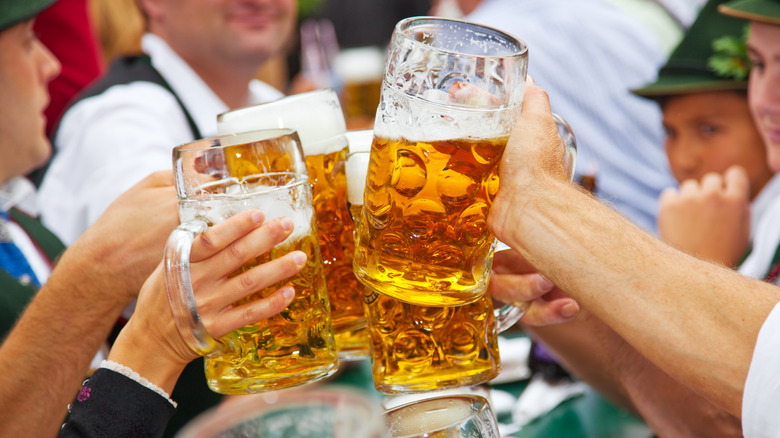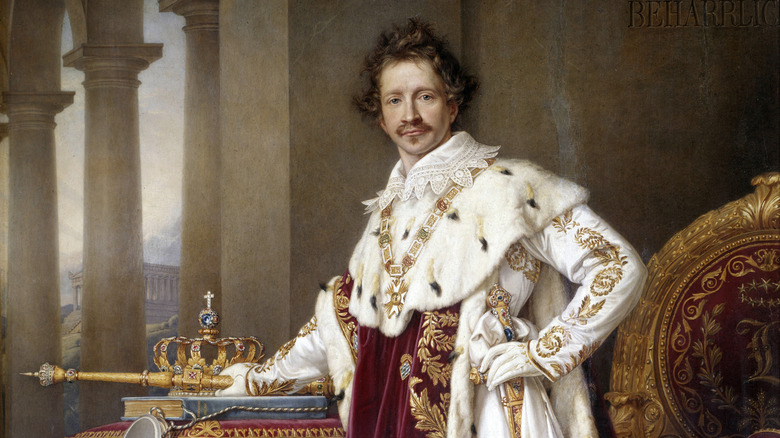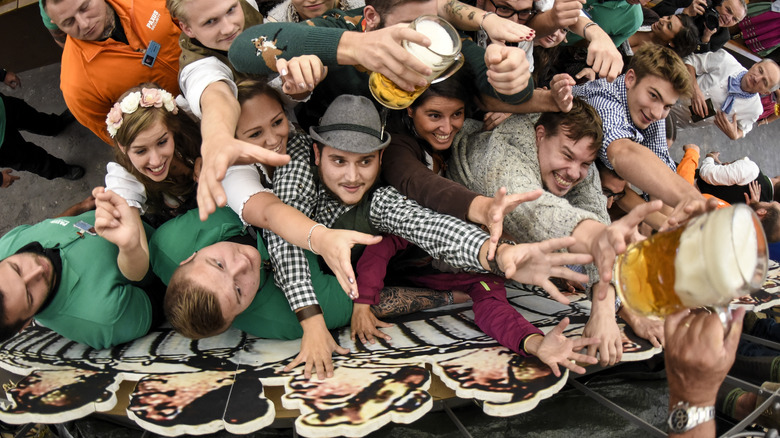Why Does Oktoberfest Happen In September?
Even if you have never been to a traditional German Oktoberfest celebration, you likely have a solid mental image of what the festival looks like. Long tables piled high with food and drink, particularly large, soft pretzels, sausages, oversized hunks of roasted meat, and, of course, enormous glass tankards of frothy beer. You can probably also picture the traditional German Oktoberfest costumes, particularly lederhosen (leather pants) and the low-cut gingham dresses of the festival barmaids.
But while Oktoberfest may be vaguely familiar as a particularly indulgent German institution, the background behind it is less known, nor the fact that the beer-drenched festival, which lasts for roughly two weeks, takes place over more days in September rather than Oktober. Though the dates may change year on year — the parameters of the festival are decided by the government in Munich, Bavaria, where the festival originates and where the original is still held annually — it has historically run for 16 days leading up to the first Sunday in October, which is the anniversary of a historical Bavarian royal wedding that took place on October 12, 1810.
According to Reader's Digest, the earlier start date was introduced to increase the chance of warm weather and because daylight lasts longer, making for a better all-around experience for festival-goers. But since the mid-1990s, the festival has grown even longer, as a way of celebrating the reunification of Germany.
The Royal Origin of Oktoberfest
The beginning of Oktoberfest goes all the way back to 1810 when the Bavarian city of Munich was looking to stage a public event to mark a major event in the royal calendar: the marriage of Prince Regent Ludwig of Bavaria — later known as King Ludwig I — to another member of German nobility, Princess Therese of Saxony-Hildburghausen. That year, the main event was a horse race, though there were none of the beer tents that are undoubtedly the main attraction today. However, the event was a huge success, and over the next century, the festival continued and evolved. Throughout the 1910s the annual event was thwarted by the Napoleonic Wars, but by the end of the century, Oktoberfest had emerged as a much-loved institution by which to celebrate all things Bavarian.
As well as being the seat of the historic monarchy of Bavaria, Munich has long been famed for its excellent beer, particularly that made by its six historic breweries, the oldest of which, Augustiner, was started by monks in the 14th century. Over the years, the involvement of the breweries has become central to the Oktoberfest celebrations, which serve as a major branding opportunity for the six breweries. Today, Oktoberfest draws around 6 million people to the Bavarian capital each year, with some drinking tents capable of holding more than 8,000 revelers at any one time.
Oktoberfest's new political significance
Though Oktoberfest is now replicated in cities across Germany and around the world every September and October, its Bavarian identity remains central to its appeal. However, in recent decades the event has also begun to look outwards and changed its parameters to take in larger national celebrations.
In particular, Oktoberfest is now seen as an element through which Germans celebrate the German Day of Unity, which takes place annually on October 3 and celebrates the official reunification of East and West Germany that came about in 1990 along with the symbolic fall of the Berlin Wall. Though Oktoberfest has typically ended on the first Sunday of October each year, since 1994 it has been agreed that should Sunday come before October 3, then the festival is extended to the third day of the month to allow Oktoberfest attendees to raise a toast to the formation of the country as it is known today. Today, Oktoberfest is also a popular event in many cities across the United States, celebrating the cultural heritage of German migrants.


